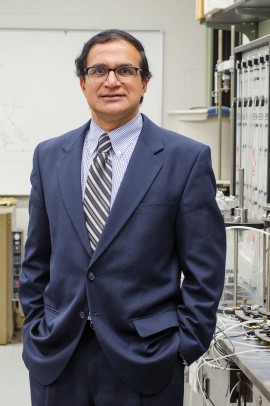‘A technical solution is not enough; we have to have sustainability’

Krishna Reddy: “The first thing in all my research is that I want to identify real world problems.” Photo: Joshua Clark/UIC Photo Services
The Researcher of the Year Award recognizes 10 UIC scientists who are advancing knowledge in their fields. The Distinguished Researcher Award honors five researchers with a record of outstanding achievement. The Rising Star Award honors early-career researchers who show promise as future leaders.
NATURAL SCIENCES & ENGINEERING
Krishna Reddy
Distinguished Researcher
Krishna Reddy has a three-step approach to the young field of geoenvironmental engineering: hypothesis, lab testing, then taking the solution to the field.
Reddy is partnering with the Chicago Park District to manage storm water and wetland restoration. He’s working on landfill remediation with grants from the National Science Foundation. “The first thing in all my research is that I want to identify real world problems,” says Reddy, professor of civil and materials engineering.
He starts with a research hypothesis — the technical solution to the problem at hand. Soil is different from site to site, contaminants are different, the chemistry is different, he says.
“My goal is always to look at the site-specific conditions and tailor the technical solution accordingly. A company might sell you one thing for everything, but that doesn’t work in the remediation field. That’s why I work in many different technologies. And I believe in integrating the technologies — the situations are so complicated.”
Next, he formulates a laboratory research program. “I’m a big believer is working on the lab scale first. You don’t want to just go out to the field and spend millions of dollars and figure out that it doesn’t work,” he says. “For me and my students, the exciting part is taking it into the field and seeing if it works or fails.”
Reddy works mostly in the Chicago area. He needs sites that are easily accessible to collect data frequently and quickly. “With studies of storm water, for example, we have to go out as soon as it rains,” he says.
He collects data in all kinds of conditions, including extreme weather. There is little data on low temperature conditions, he says. “And a lot of things are temperature dependent.”
Reddy clearly enjoys the challenges of his profession — the soil and foundation at each site brings a new problem to solve. “A lot of people in the field when I began were chemists or chemical engineers who were only dealing with water and couldn’t understand the soil,” he says. “But I have come to see that a technical solution is not enough; we have to have sustainability.”
It’s also important to acknowledge the economic impact, he says. “Often engineers don’t involve the communities, making decisions that the community may not want,” Reddy says. “It’s important to bring them on board, to educate them.”
